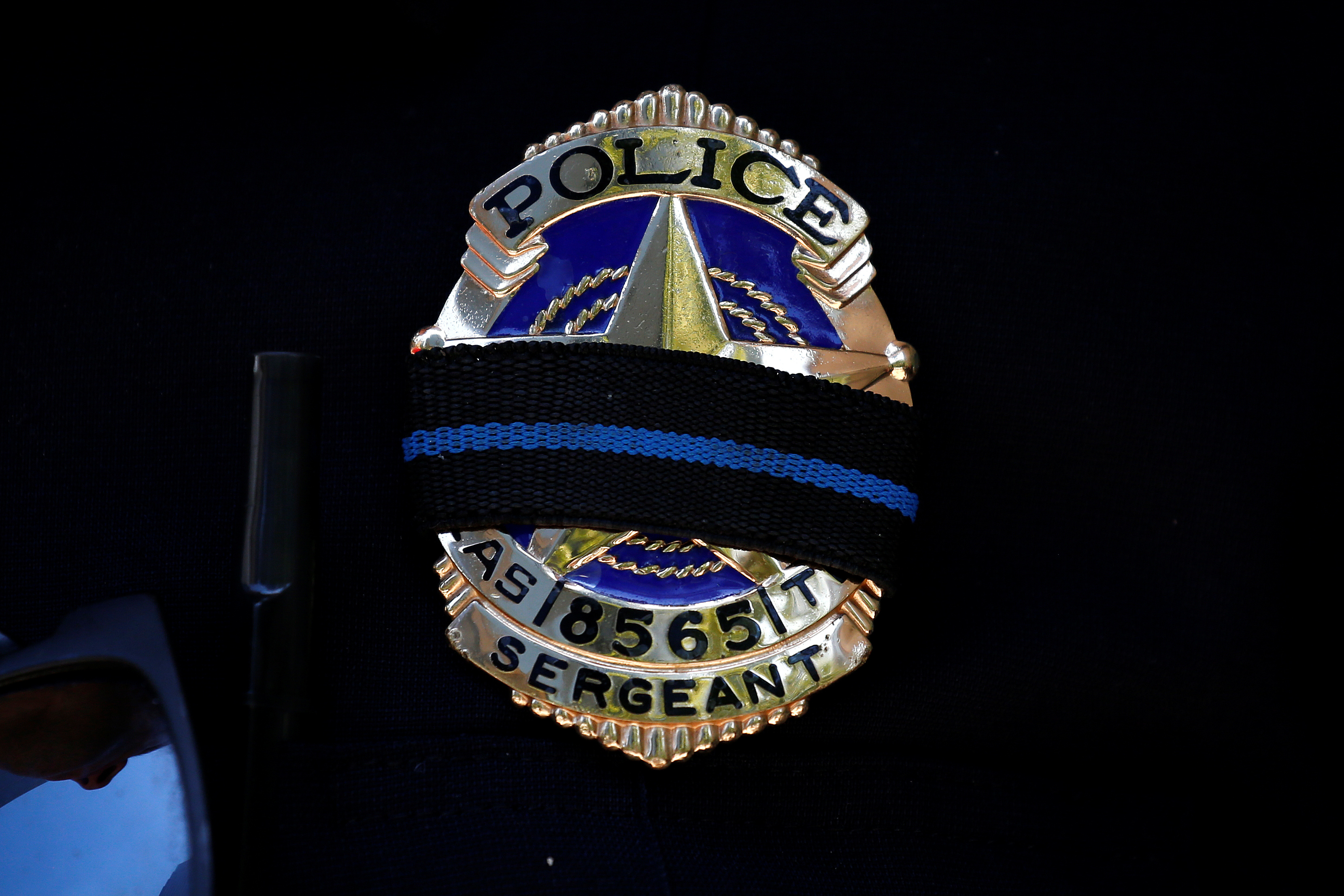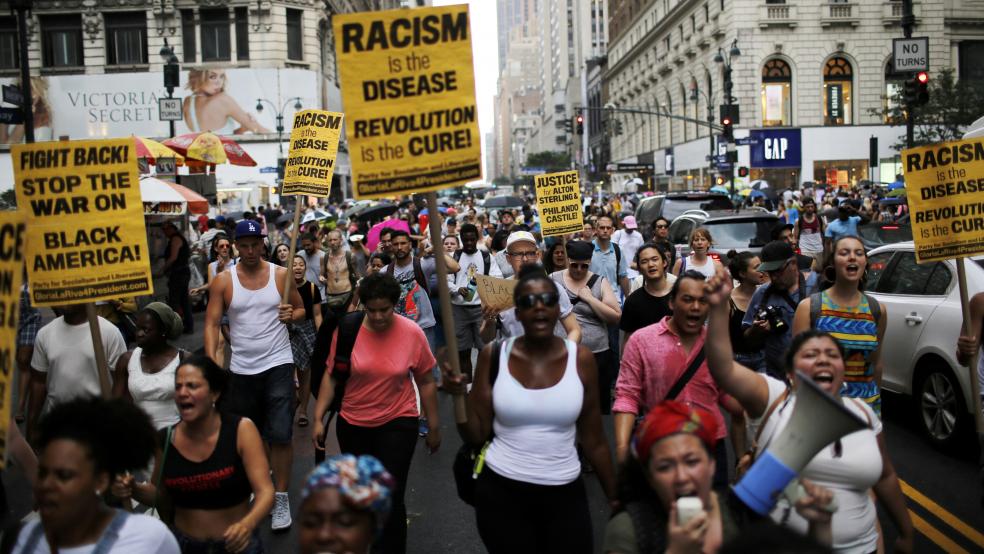There were too many things about this week that were both horrifyingly shocking and achingly familiar. Video so wrenching people couldn't bear to watch it, even as they couldn't turn away. Images of agonized family members. Even the debate over whether a tragic shooting in Dallas was the work of a lone gunman or not, which dominated conversation roughly half a century ago...and this morning.
There was more depressing deja vu in the political realm. "Who’s to blame for Dallas?" asked Philip Bump, who noted that for some, the answer appeared to be "whomever you already disliked." In the immediate aftermath of the attack, some politicians pointed to political rivals, or to people who held different positions on related issues. Some highlighted policies they wanted to strengthen, like gun control; others to policies they'd like to eliminate, like the War on Drugs.
Related: Justice Department 'Assessing' Minnesota Police Shooting
But there were surprises, too — political figures who reacted with unusual sensitivity, or in unexpected ways.
This morning, Donald Trump released a statement that didn't speculate on any political motives of the gunman who killed five law enforcement officers in Dallas, and wounded seven. He didn't suggest that anti-police rhetoric could have sparked the incident, as he has in the past, or boast of predicting that such an event would happen, as he did after the mass shooting in Orlando.
He left all that out, but included something even more notable: the word "senseless," used in reference to the deaths of Alton Sterling and Philando Castile by police offers earlier this week — events that helped lead to the Dallas demonstration where police were targeted. ("The senseless, tragic deaths of two motorists [sic] in Louisiana and Minnesota reminds us how much more needs to be done," he said.)
Republican presidential candidate Donald Trump said the shooting of police officers at a Dallas protest has "shaken the soul of our nation." Five officers were killed and seven others injured after a shooter opened fire. (Facebook/Donald J. Trump)
Related: U.S. Justice Department to Probe Police Shooting of Louisiana Black Man
"Whether Trump's campaign intended it that way or not, [the line] suggests there was no 'discernible meaning or purpose' for the deaths of Alton Sterling in Louisiana and Philando Castile in Minnesota," wrote Aaron Blake. "That's something demonstrators protesting police violence would certainly agree with; it's a word law enforcement probably wouldn't use to describe the deaths, which will be the subject of investigations that will officially determine whether there was any justification for the shootings.
"'...[S]enseless' is a very loaded word in what is a very heated political debate over police violence. And it's not loaded in the political direction in which Trump generally veers."
The presumptive Republican nominee had some conservatives on his side, even as others pushed back from the right. Late in the afternoon he released a video statement in which he referred to the Louisiana and Minnesota victims by name:
Trump releases video statement from Trump Tower on this week's shooting. Mentions Sterling and Castile by name. pic.twitter.com/epKBBcvpDT
— Sopan Deb (@SopanDeb) July 8, 2016
He wasn't the only conservative politician who urged sympathy for the protesters' cause today, even as they expressed support for police. In a Facebook Live chat with CNN analyst Van Jones, possible Trump vice presidential pick Newt Gingrich called for greater empathy:
"It is more dangerous to be black on America. It's both more dangerous because of the crime, which is the Chicago story... But it is more dangerous in that [you are] substantially more likely to be in a situation where police don't respect you and where you could easily get killed. And I think sometimes, for whites, it's difficult to appreciate how real that is. It's an everyday danger."
Gingrich added, according to the Atlanta Journal-Constitution: "It took me a long time, and a number of people talking to me through the years to get a sense of this. If you are a normal white American, the truth is you don’t understand being black in America, and you instinctively under-estimate the level of discrimination and the level of additional risk.”

Related: Beyond Dallas, Police Come Under Fire in Three Other States
Hillary Clinton made a point similar to Gingrich's (quick pause to note that this is a sentence we never thought we'd type.) “White Americans need to do a better job of listening when African Americans talk," she said today, as she delivered remarks that quoted the Bible and Elie Wiesel, and called for a billion-dollar investment in police training, reported Abby Phillip:
"'There is too little trust in too many places between police and the communities they are sworn to protect,' Clinton said at the African Methodist Episcopal Church general conference in Philadelphia. 'With so little common ground, it can feel impossible to have the conversations we need to have, to fix what’s broken. ...Let’s acknowledge that implicit bias still exists across society and even in the best police departments. We have to tackle it together.'
"...Clinton’s comments came hours after five police officers were shot dead in Dallas and seven others were wounded after they were fired upon by a gunman armed with a semi-automatic rifle. "...'We know that there is something wrong in our country,' Clinton said. 'There is too much violence, too much hate, too much senseless killing, too many people dead who shouldn’t be.'
"Clinton pledged that as president, she would push to develop national standards for the use of force by police and she would commit $1 billion to police training programs and new research into the best policing practices.
"'We’ll make it clear when deadly force is warranted, and when it isn’t,' Clinton added. 'And we’ll emphasize proven methods for de-escalating situations before we reach that point.'...
"But she also reiterated her call for more 'understanding' between communities and police in the wake of the string of tragedies this week. 'We have to make up our minds that we’re going to bring this country together,' Clinton said earlier in an interview on CNN."
By the end of the day, the conversation was edging back into more familiar territory:
Isn't it sad that on a day of national tragedy Hillary Clinton is answering softball questions about her email lies on @CNN?
— Donald J. Trump (@realDonaldTrump) July 8, 2016
Related: GOP Demands New Criminal Investigation of Clinton, This Time for Perjury
So, about those emails...we couldn't believe how many times one word in particular kept popping up today (emphasis ours):
"Hillary Clinton deflected responsibility Friday for what the FBI called her careless handling of sensitive government secrets, saying that officials with whom she corresponded as secretary of state did not treat the information as secret," reported Anne Gearan.
"In her first remarks about FBI findings that were highly critical of her stewardship of classified information, Clinton said she made a mistake in setting up the privately owned email system she used when she was secretary of state. But she repeatedly noted that information later identified as classified was part of correspondence with hundreds of government officials who did not flag any problem.
"'I believe and have said many times that I take classified material seriously,' Clinton said in an interview with NBC. 'I dealt with over 300 people in the State Department, many with decades of experience, who understand clearly how to handle classified material.'
"In most but not all cases investigated by the FBI, others initiated communications with content that was later identified as sensitive. Those messages were sent directly or forwarded to Clinton.
"The references to other government officials, repeated in other interviews Clinton conducted Friday, represent a new line of defense in the long public debate over an issue that has led many voters to say they do not trust her.
"'I do not believe that all of the professionals that I dealt with in the State Department were careless in handling classified material,' Clinton said. ‘I do not believe that they did anything that in any way, they believed, was inappropriate. ..."
The question now, of course, is just how much voters...believe her.
This article appeared originally in The Washington Post. Read more at The Post:



